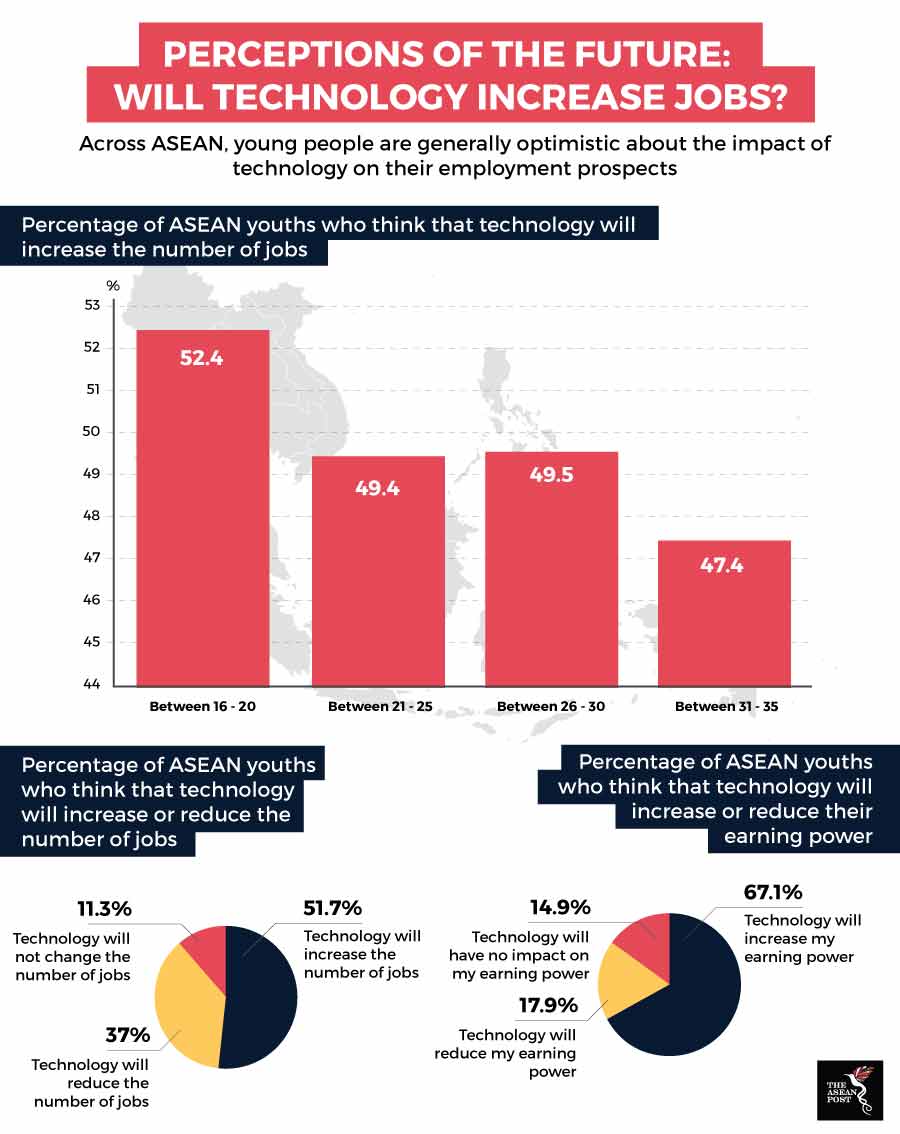Youths in the region are extremely positive about the impact of technology on job prospects and income, a survey by the World Economic Forum (WEF) and Singapore-based internet company, Sea has revealed.
Of the over 40,000 respondents, around 52 percent of the under-35 generation across the region believe that technology would be able to increase the number of jobs. 67 percent said they believed it would lead to an increase in their ability to earn higher incomes.
Forecasts by the United Nations (UN) indicate that the working-age population across ASEAN is expanding by an astounding 11,000 workers daily and this growth momentum would likely be sustained for the next 15 years. The breakneck pace of this demographic expansion is happening at a time when the Fourth Industrial Revolution is in full swing.
By 2020, this revolution will have brought us advanced robotics and self-driving transport, artificial intelligence (AI), and machine learning, besides modern materials, biotechnology, and genomics. Against this backdrop, employability in a modern world becomes more difficult as new skills need to be adopted.
“No one knows yet what impact these technologies will have on jobs and salaries,” said Justin Wood, Head of Asia Pacific and Member of the Executive Committee at WEF.
“Globally there is concern that technological change may bring rising inequality and joblessness. But in ASEAN, the sentiment seems to be much more positive,” he added.
Will technology increase jobs and income?
It is crucial to note that the degree of optimism varies from country to country where ASEAN youths from higher income nations were more pessimistic about the future of jobs than those from lower income countries.
For example, the youth from Indonesia and the Philippines were relatively more optimistic in their responses compared to their counterparts in Thailand and Singapore. Only 31 percent of Singaporeans polled believed that technology would increase the number of jobs as opposed to 60 percent of youth in the Philippines.
The results also varied in accordance to levels of education. Interestingly, ASEAN youths who possess a Bachelors or higher degree were more pessimistic about the future outlook of jobs compared to those without schooling. 56 percent of those who had no schooling said they believed that technology would be responsible for the creation of new jobs while only 47 percent of those who hold a university degree felt the same way.

Source: World Economic Forum
This correlation opens up much room for interpretation. One explanation is that those with higher incomes and a higher degree of education tend to be more aware of the potential negative impacts that technology could have on jobs. It can also be surmised that countries with higher incomes have a larger number of workers employed in the formal sector which is susceptible to disruption, hence, it could directly impact the predictability of their future income.
Preparing for the future
The survey also demonstrated that ASEAN youth prefer working for a foreign multinational or in the public service. 10 percent work for a foreign multinational company today but 17 percent want to work for one in the future. 13 percent currently work in the public service but 16 percent want to do so in the future. Meanwhile, 17 percent work in small, medium enterprises (SME) but only seven percent said they would want to work for an SME in the future. One in four aspire to work for themselves and start their own business.
What these results indicate is a preference for income stability given the unpredictability of working for a smaller organisation as opposed to a larger one. Nonetheless, some countries do demonstrate a rising spirit of entrepreneurialism and the associated risk-taking it entails.
The percentage of youths in Thailand, Malaysia, Vietnam and Singapore who want to be self-employed in the future is higher than the percentage of those who currently work for themselves. This trend is inversed in Indonesia and the Philippines.
Santitarn Sathirathai, Group Chief Economist at Sea is encouraged by the strong spirit of entrepreneurship but warned that this may impact talent in SMEs in the future.
“Looking ahead, it will be important to continue to enhance SME adoption of digital technologies to ensure young entrepreneurs and small businesses have the resources they need to succeed,” he opined.
One way of doing so is to improve education and training, and in this digital age, such services can be administered online. However, ASEAN youth have yet to embrace online education as only 14 percent have used such services extensively whereas 52 percent have never used it. Besides that, only 31 percent believe online learning is more effective than traditional classroom learning while 35 percent believe it is less effective.
Nevertheless, when analysed closely, those with lower levels of education tend to adopt a more positive view about online education compared to those with higher education. This could mean that online education can be a viable alternative for those with less access to formal education.
Related articles:
Industry 4.0 and a people-centric ASEAN
